 |
|
The recent warming of relations between Pakistan and Bangladesh presents a complex geopolitical challenge for India, necessitating a recalibration of its regional strategy. For decades, relations between Pakistan and Bangladesh, particularly during Sheikh Hasina’s leadership, were characterized by strain and historical baggage stemming from the 1971 Liberation War. However, the recent developments, including the visit of Pakistan’s Foreign Secretary Amna Baloch to Bangladesh and a series of diplomatic and economic initiatives, signal a significant shift in the regional landscape. These initiatives, encompassing direct shipping routes, enhanced trade prospects, a relaxed visa regime, and a planned visit by Pakistan’s Foreign Minister, indicate a concerted effort to forge closer ties between the two nations. This newfound bonhomie arrives at a time when India's relationship with Bangladesh, while historically strong, faces certain headwinds. The convergence of these factors underscores the need for India to adopt a cautious and proactive approach to safeguard its strategic interests in the region.
The foundation of the India-Bangladesh relationship, particularly under Sheikh Hasina and Narendra Modi, was built on pillars of economic cooperation, connectivity-linked infrastructure development, people-to-people initiatives, and cultural exchanges. Trade ties flourished, reaching approximately $12 billion in 2024, with India emerging as Bangladesh's second-largest exporting partner. This robust trade relationship was facilitated by various initiatives, including the establishment of Integrated Check Posts (ICPs) at key border crossings, the provision of transit rights, the development of trade corridors, and maritime cooperation treaties that granted India access to the Chattogram and Mongla ports. However, recent setbacks, such as the revocation of a transhipment facility by India for exports from Bangladesh to third countries, and the existing ban on the import of selected Indian products by Bangladesh, have introduced friction into the relationship. These developments highlight the sensitivity of the economic ties and the potential for bilateral tensions to arise from trade-related issues. The revocation of the transhipment facility, in particular, could have significant implications for Bangladesh's export competitiveness, especially as it prepares to graduate from Least Developed Country (LDC) status in 2026.
The changing dynamics in the region are further complicated by the increasing influence of China. Beijing's growing economic and strategic footprint in South Asia has the potential to reshape regional alliances and power dynamics. China's close relationship with Pakistan, combined with its growing engagement with Bangladesh, presents a strategic challenge for India. The trilateral relationship between Bangladesh, Pakistan and China could create a new regional dynamic, potentially limiting India's influence. For India, this necessitates a proactive and multi-faceted approach that focuses on strengthening its existing partnerships, cultivating new alliances, and promoting regional stability. This includes actively engaging with Bangladesh to address its concerns and promote mutually beneficial economic cooperation, as well as fostering closer ties with other countries in the region to counter the growing influence of China. The need for a strategic approach is further amplified by the situation along the border with Myanmar, which is experiencing civil unrest and instability, adding another layer of complexity to the security environment.
Bangladesh's impending graduation from LDC status in 2026 presents both opportunities and challenges. While graduation signifies economic progress, it also entails the loss of preferential trade treatment, increased tariffs, and stricter compliance standards in international markets. This could impact Bangladesh's export competitiveness, particularly in the ready-made garments sector, which is a major source of export revenue. Moreover, it could lead to increased competition with India in key export markets. The author highlights the impact of tariffs imposed by the US as an example. These tariffs are higher for Bangladesh (37 per cent) as compared to India (26 per cent) impacting the competitiveness of Bangladesh made garments. These factors necessitate that Bangladesh proactively address these challenges by diversifying its export base, improving its infrastructure, and enhancing its competitiveness. Simultaneously, India should be willing to support Bangladesh in this transition by providing technical assistance, promoting investment, and facilitating trade. While Pakistan-Bangladesh trade shows no significant progress at this time, it also presents an opportunity for both to address opportunities and strengthen ties
Given the evolving geopolitical landscape, India must remain vigilant and proactive in safeguarding its interests in South Asia. This requires a multi-pronged approach that encompasses diplomacy, economic cooperation, and security cooperation. India should actively engage with Bangladesh to address its concerns and promote mutually beneficial economic cooperation. The operationalisation of “Border Haats” which provide a significant impact on border economies through enhanced trust, people-to-people connect, local livelihood generation, and women’s empowerment were a key success story of India-Bangladesh cooperation. India needs to strengthen these kind of initiatives. India should also cultivate closer ties with other countries in the region to counter the growing influence of China. This includes deepening cooperation with countries like Nepal, Bhutan, and Sri Lanka, as well as exploring new partnerships with other regional players. Furthermore, India should enhance its security cooperation with Bangladesh to address shared security challenges, such as terrorism, cross-border crime, and maritime security. It is important for India to not give up its role as a leading country in South Asia and let other countries drive the political and economic narrative in the region.
Source: As Pakistan and Bangladesh get close, India should be watchful
